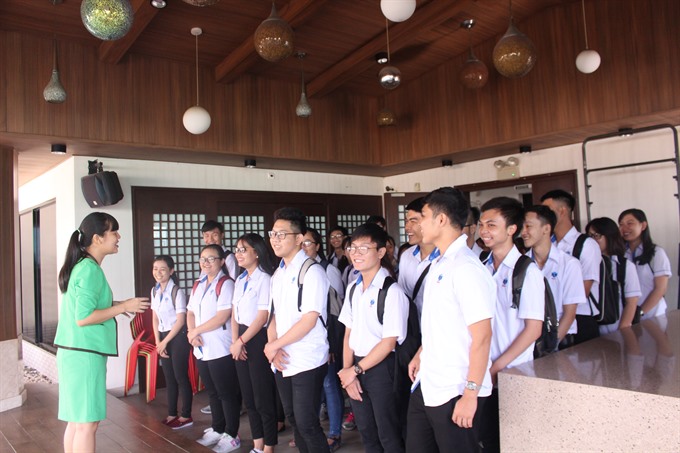 Society
Society

Many colleges and universities are offering courses and college-level programmes in foreign languages, culture and academic subjects for students who plan to work abroad.
 |
| The HCM City University of Food Industry is carrying out a two and a half year training college-level programme on professional academic knowledge, Japanese language and culture, and workplace skills for Japanese businesses for students who will work in Japan and return to Việt Nam for a bachelor’s degree. —Photo courtesy of the university |
HCM CITY — Many colleges and universities are offering courses and college-level programmes in foreign languages, culture and academic subjects for students who plan to work abroad.
The HCM City University of Food Industry, for instance, is carrying out a two and a half year programme that includes courses in the student’s major, training in Japanese language and culture, and workplace skill for Japan’s business culture.
The students graduating from the programme would receive a college-level degree (not a university diploma) and work in Japan, said Phạm Thái Sơn, director of the university’s Centre for Enrollment and Communication, at a conference on improving the quality of guest workers in foreign countries.
The conference was organised yesterday by Tiền Phong (Vanguard) newspaper in co-operation with the Department of Overseas Labour at HCM City’s Văn Hiến University.
The HCM City University of Food Industry this year has enrolled students in its departments of food processing technology, food technology, seafood processing technology, mechanical engineering, industrial electronics and electricity.
After graduating from the two and a half year programme and working in Japan, the students will return to study for a bachelor’s degree and learn management skills.
“The programme aims to train high quality human resources who will return to Việt Nam,” Sơn said.
Dương Thị Thu Cúc, of the Sài Gòn International Service Company Ltd, said that compared to the past, Japanese enterprises had now lowered recruitment criteria and would accept college and vocational school graduates.
“Japanese enterprises need many Vietnamese workers, including in technology and nursing,” Cúc said, adding that nurses could work for a long time in the country.
"When guest workers in Japan return to Việt Nam, they will be able to get jobs as translators and other positions at Japanese companies at a salary at least 30 per cent higher than Vietnamese employees who do the same job,"Cúc said.
They also could work as a Japanese teacher for companies providing services relating to work overseas.
Văn Hiến University is also cooperating with foreign universities and enterprises to create conditions for its students to have internships abroad for three to 12 months.
Trần Thị Vân Hà of the Department of Overseas Labour said that many Vietnamese work in Taiwan, South Korea, and Japan.
The department is expanding the guest worker market to the Middle East and Europe, Hà said.
As of October, 120,000 Vietnamese workers had been sent this year to other countries, an increase of 20 per cent compared to the same period last year.
Last year, Việt Nam had 135,000 guest workers in other countries, higher than in the previous five years.
Hà said the quality of guest workers was becoming better. The rate of trained guest workers rose from 35 per cent in 2016 to 65 per cent this year. — VNS




